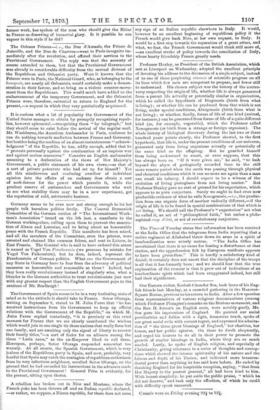Professor Huxley, as President of the British Association, which met
at Liverpool on Wednesday, adopted the excellent principle of devoting his address to the discussion of a single subject, instead of to one of those perplexing resumes of scientific progress on all its lines which few men are competent to prepare, and fewer still to understand. His chosen subject was the history of the contro- versy respecting the origin of life, whether life is always generated from- a parent life actually or potentially similar in organization, which he called the hypothesis of Biogenesis (birth from what is living) ; or whether life can be produced from that which is not living, under special conditions, Abiogenesis (birth from what is not living) ; or whether, finally, forms of life of one kind (animal, for instance,) can be generated from forms of life of a quite different kind (as, for example, vegetable), which the Professor called Xenogenesis (or birth from a strange or foreign organism). The whole history of biological discovery during the last two or three hundred years points clearly, the Professor showed, to the first hypothesis, that life is, under the present conditions of our universe, generated only from living organisms actually or potentially of the same kind as the offspring. But he guarded himself from being understood to assert, or even suppose, that this has always been so. "If it were given me," he said, "to look beyond the abyss of geologically recorded time to the still more remote period when the earth was passing through physical and chemical conditions which it can no more see again than a man can recall his infancy, I should expect to be a witness of the evolution of living protoplasm from not living matter." But Professor Huxley gave no sort of ground for his expectation, which appears to us pure conjecture. Surely we ought to find even now producible evidence of what he calls Xenogenesis,—i.e., the produc- tion from one organic form of another radically different,—if the origin of life is to be found in special combinations of that which is not living. We should call the Professor's " expectation" not what he called it, an act of " philosophical faith," but rather a philo- sophical coup d'etat, or act of revolutionary conjecture.






























 Previous page
Previous page